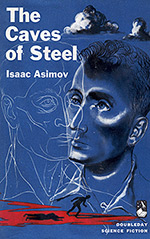
![]() charlesdee
charlesdee
8/7/2015
![]()
Now that we hear serious conversations about everything from online medical examinations to robotic barristas, Isaac Asimov's 1950's robot novels read, if not as though ripped from today's headlines, as at least eerily predictive of our very near future. We already hear dire warnings of massive job loss and a general leveling of culture with a scarcity of human-to-human interaction that robotics will bring about. There are characters in Caves of Steel, known as Medievalists, who dream of an idealized earlier time, like the 20th century. Then life was lived under clear skies, cities were not massive warrens, and the food did not all come from yeast. And there were no robots.
Asimov's novel is a fun read, even if it consists largely of massive info dumps separated by moments of sporadic action. I have not read much Asimov, but judging from Caves of Steel, he knew how to make all that exposition engaging. What doesn't work so well here is the mystery. Our hero is a police detective and his partner is a new model robot that can pass for human. Their investigation provides us with our entertaining tour of this future world, but the resolution of the mystery is anti-climactic. And it requires the dozen or pages of boring "this is how I figured it out" monolog that is the bane of whodunits since Sherlock Holmes.